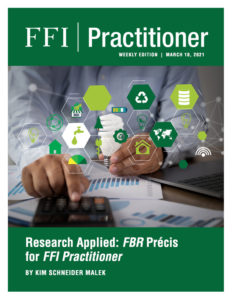
View this edition in our enhanced digital edition format with supporting visual insight and information.
Thanks to this week’s contributor, Kim Schneider Malek of the FBR Research Applied Board, for her précis of “Founder-Controlled Family Firms, Overconfidence, and Corporate Social Responsibility Engagement: Evidence from Survey Data,” which appears in the March 2021 issue of FBR. In this précis, Kim provides a summary and key findings of the research and explores practical implications for families, advisors, and researchers in the field.
Introduction
Ownership and control are foundational to private enterprises, allowing those who possess them to set vision, to design their mission, to plan for the strategic deployment of resources, and to establish a culture based on personal values.
One such area demonstrating this assertion is that of corporate social responsibility (CSR). CSR activities and engagement are purposeful choices and directed investments, ranging from small, firm-initiated gestures to more consuming commitments, and from free will self-accountability to government-regulated compliance and reporting standards. In exchange for these consequential decisions, firms gain (or lose) varying degrees of reputation.
When family enterprises commit to and engage in CSR, they subject themselves to the eventuality of external, non-ownership influences affecting the decision-making and threatening some loss of control for owners. For founder-controlled family firms (FCFFs), the threat of losing control provokes certain psychological biases, behaviors, and traits. These reactions can trigger a compounded response to protect ownership prerogative, control privileges, and preserve socioemotional wealth (SEW) that ownership families work so hard to uniquely acquire.
Theory, Hypotheses, and Research
In this article, the authors seek to expand the body of family firm-related SEW research by studying the influence of the SEW dimensions of family control and family identification with psychological decision-influencing traits on FCFFs. Drawing on SEW dimensions, behavioral economics, and psychological perspectives as theoretical frameworks, the authors explore the following questions:
- In what ways do FCFFs attach greater importance to doing that which maintains control, rather than doing that which enhances image and reputation?
- How do SEW dimensions and decision reference points shape the CSR engagement of family-controlled family firms?
- How does the psychological trait of overconfidence mitigate or shift the perception of different SEW dimensions from family control to family identification?
The authors posit two hypotheses and organize their survey-style inquiry around two categories: control and reputation. The first hypothesis states that, compared to nonfamily firms, FCFFs show a lower level of CSR engagement in general—more specifically, however, FCFFs show a lower level of CSR engagement when family control is at stake, but they show a higher level of CSR engagement when reputation would benefit. The second hypothesis states that overconfidence has a positive effect on CSR activities in FCFFs but not in other firms.
The authors organized their research through computer-automated survey questions of a sample of 205 eligible Polish, mostly unlisted, medium-sized (50+ employees) firms, 191 of which showed founder presence in management and ownership. They referred to these as FCFFs.
To test their hypotheses, the authors interpret the survey subjects’ responses to external stakeholder CSR activities vs. internal stakeholder CSR activities. They identify external stakeholder activities that deliver the most benefit to a firm’s reputation, while at the same time requiring the lowest level of commitment to those external stakeholders (e.g., charitable activities).
Through subjects’ responses regarding internal stakeholder CSR activities, they explore which activities might threaten family control by enforcing a higher commitment to external stakeholders (e.g., corporate governance, information transparency, employee safety, environmental certification, investor protection, and other forms of adherence to external regulation).
Findings
The authors reach the following findings:
- Founder-controlled family firms show low levels of CSR engagement only when family control and socioemotional endowment are threatened.
- For founder-controlled family firms engaged in CSR activities, there is a conflicting commitment between two dimensions of SEW: family control vs. family identification.
- This study contributes to and expands the concept of SEW, because it demonstrates not only how different SEW dimensions are perceived by family actors in the founder stage, but also how psychological traits such as overconfidence can alter the reference points for decision-making in all aspects of FCFFs.
- Executives with a sense of managerial overconfidence demonstrate superior CSR performance. The family’s preference for control, which is sometimes evident and sometimes assumed, can be mitigated by the overconfident executive who underestimates the family’s control risk and, instead, focuses on reputation by acting socially responsible.
- Because of SEW, the nonfinancial aspects of family firms in general, and of FCFFs in particular, raise doubts as to whether these firms show the same CSR engagement exhibited by nonfamily firms.
Contributions to Practice
Several suggestions, insights, and innovations for practice in founder-controlled family firms result from this research, including the following:
For stakeholders who seek to build a relationship with founder-controlled family firms based on CSR principles:
- Recognize that the family actors will have emotional dynamics regarding the conflicting commitments to CSR activities and family control.
- Leverage resistance as a starting point to finding common ground, rather than as an obstacle.
- Understand that reluctance to engage in CSR might not be a sign of social irresponsibility or disregard, but rather an attempt to protect control and influence.
- Determine scenarios for how to leverage the intersection of family control and managerial overconfidence.
For owner families and executives in founder-controlled family firms:
- Concentrate on creating a CSR, social contribution, and social purpose intention.
- Conduct an educational initiative based on the FIBER dimensions model of SEW, so ownership family members and executives can acknowledge when a SEW resource is being threatened or when SEW dimensions are in conflict with each other.
- Identify a shared perspective or a measure of SEW value for each of the five SEW dimensions.
- Explore scenarios in which SEW dimensions of family control and family identification may be challenged by possible CSR activities; determine the point at which founder-controlled family firm owners and executives begin to demonstrate discomfort or resistance.
- Maintain a written and shared list of advantages gained from CSR activities that might not necessarily endanger family control but could promote image and reputation, could foster stakeholder relations, and could demonstrate legitimacy as good corporate citizens.
Footnote
1 Socioemotional wealth consists of five dimensions, often referred to by the acronym FIBER. The following dimensions each serve as decision-reference points in FCFF:
- Family control and influence (family control)
- Identification of family members with the firm (family identification)
- Binding social ties
- Emotional attachment of family members
- Renewal of family bonds to the firm through dynastic succession
About the Contributor

Kim Schneider Malek, FFI Fellow, is a twenty-five-year, second-generation practitioner advancing family enterprise through consulting, facilitation, and education. A former GEN faculty member, past member of the Body of Knowledge committee, and co-founding editor of FFI’s online publication, FFI Practitioner, Kim received the 2014 Barbara Hollander Award for leadership and educational contribution to the field. Kim is the founder president of Family Enterprise Alliance, LLC, a global consulting firm, director of the Bailey Program for Family Enterprise, and an assistant professor of the practice at the University of Denver Daniels College of Business where she has been teaching since 2001. She can be reached at kim.malek@du.edu or kim@advancingfamilyenterprise.com.

View this edition in our enhanced digital edition format with supporting visual insight and information.





